Related Research Articles

The Rural City of Mildura is a local government area in Victoria, Australia, located in the north-western part of the state. It covers an area of 22,083 square kilometres (8,526 sq mi) being the largest LGA in the state. In June 2016 the area had a population of 53,878. It includes the city of Mildura and the towns of Merbein, Red Cliffs, Irymple, Ouyen, Werrimull, Murrayville, Walpeup and Hattah. It was formed in 1995 from the amalgamation of the City of Mildura, Shire of Mildura and Shire of Walpeup.
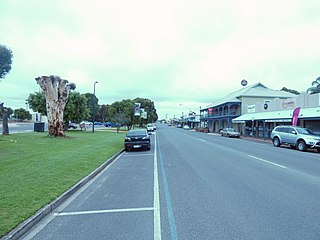
Tailem Bend or "Tailem" which in Ngarrindjeri means "Bend in the river" is a town on the Murray River in South Australia and the home of The Bend Motorsport Park. It is located less than 100 km south-east of Adelaide. It is located on the cliffs above the east (left) bank of the Murray River close to where the river empties into Lake Alexandrina.
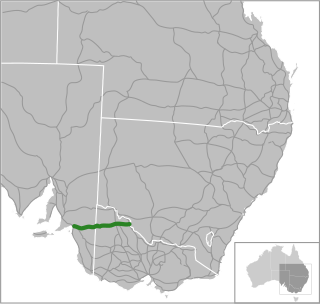
Mallee Highway is a highway in south-eastern South Australia and north-western Victoria, running mostly across the Mallee plains. It forms part of the shortest route between Adelaide and Sydney.
The Murray Mallee is the grain-growing and sheep-farming area of South Australia bounded to the north and west by the Murray River, to the east by the Victorian border, and extending about 50 km south of the Mallee Highway.
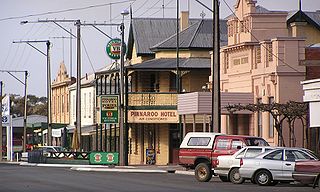
Pinnaroo is a town in the Murray Mallee region of South Australia, near the border with Victoria, 243 km east of Adelaide. Pinnaroo is on the north side of the Mallee Highway, and on the railway line between Tailem Bend and Ouyen. The roadhouse on the highway at Pinnaroo is the first "food and leg-stretch" stop on the bus route from Adelaide to Sydney. At the 2016 census, the locality of Pinnaroo had a population of 712 of which 547 lived in and around its town centre.
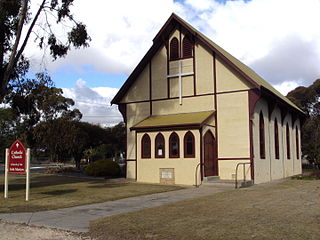
Lameroo is a town in the Murray Mallee region of South Australia. It is on the Mallee Highway and Pinnaroo railway line about 40 km west of the Victorian border, or 210 km east of Adelaide. It is primarily a service town for the surrounding rural areas, growing grain and sheep. Lameroo now includes the former settlements of Kulkami, Mulpata, Wirha and Gurrai, which were on the Peebinga railway line, and Wilkawatt, which was between Parrakie and Lameroo on the Pinnaroo railway.

The Mallee Football League (MFL) is an Australian rules football competition in South Australia. The league comprises teams located in south eastern South Australia and one team (Murrayville) located in western Victoria.

The Shire of Walpeup was a local government area in northwestern Victoria, Australia, along the South Australian border. The shire covered an area of 10,964 square kilometres (4,233.2 sq mi), and existed from 1911 until 1995.

The Murraylands is a geographical region of the Australian state of South Australia (SA); its name reflects that of the river running through it. Lying due east of South Australia's capital city, Adelaide, it extends from the eastern slopes of the Mount Lofty Ranges to the border with the state of Victoria, a distance of about 180 kilometres. The north-to-south distance is about 130 kilometres. The region's economy is centred on agriculture, and tourism, especially along its 200-kilometre (120-mile) frontage of the River Murray.
The Pinnaroo Line serviced the agricultural districts of the Mallee in the Australian states of South Australia and Victoria for the freight of grain, although there were periods of passenger travel on the line in previous years.
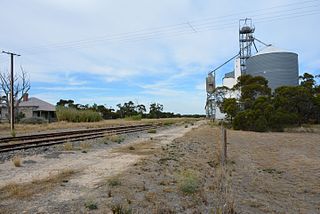
The Pinnaroo railway line ran east from the Adelaide to Melbourne line at Tailem Bend to Pinnaroo near the South Australia / Victoria state border. The route continues into Victoria via the Victorian Railways line to Ouyen where it joined the Mildura line.
The Barmera railway line was the second railway built to develop the Murray Mallee region of South Australia, in 1913. It followed the success of the Pinnaroo railway line in 1906. Both lines branched east from Tailem Bend to the north of the main Melbourne–Adelaide railway. The Brown's Well line was the more northerly, and extended into country which had not been developed much before the railway, partly due to the absence of any viable transport route for produce. The original terminus of the Brown's Well railway was at Meribah, not far from the Victorian border.
The Peebinga railway line was a railway line on the South Australian Railways network. It opened on 28 December 1914 from a junction with the Barmera line at Karoonda and ran generally eastward through the Murray Mallee terminating at Peebinga, two kilometres from the Victorian state border. It closed on 7 December 1990.
Richard Alfred O'Connor was an Australian politician. He was a Liberal Union member of the South Australian House of Assembly from 1915 to 1921, representing the multi-member seat of Albert.

Mount Gambier-Heywood railway line is a 5 ft 3 in line located in Australia which operated from 27 November 1917 to 11 April 1995 between Mount Gambier in the state of South Australia and Heywood in the state of Victoria. It is one of two railway lines built by both state governments following an agreement in 1912 to connect to each other's railway networks. There has been calls for standardisation over the past two decades from Heywood to Wolseley since the Melbourne to Adelaide line was converted in 1995.
The Ngarkat is a recorded title of a tribal group from South Australia. The Ngarkat lands had linked the mallee peoples of Victoria and South Australia to the river peoples of the Murray River Murraylands. Ngarkat language has been loosely grouped with Peramangk language though not by linguists, and the grouping was perhaps partly owed to the co-ownership of lands in both the Ninety Mile Desert and Echunga by John Barton Hack, and partly to the occasional meeting of tribes. The language of the Ngarkat was recorded as being Boraipur by Ryan in recent times though sources were not given, while it may yet be telling that the citing work concerns Mallee peoples to the east. The language may have been midway between that of mallee peoples to the east, and that of peoples to the west recorded by Teichelmann and Schurman. It is known that songlines linked the Coorong to the Mallee regions, hence went through Ngarkat land. It is also known that Ngarkat people did meet regularly with tribes to the east, at sites along the Murray.
The Murray Valley Standard is a bi-weekly newspaper published in Murray Bridge, South Australia, founded in late 1934 and published continuously since then. Its main office is on Adelaide Road, Murray Bridge. It was later sold to Rural Press, previously owned by Fairfax Media, but now an Australian media company trading as Australian Community Media.
The Loxton News was a weekly newspaper published in Loxton, South Australia, and published continuously between April 1960 and April 2020.
The River News was a weekly newspaper published in Waikerie, South Australia, published from July 1956 until April 2020.
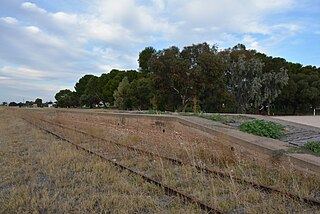
The County of Chandos is one of the 49 cadastral counties of South Australia. It was proclaimed in 1893 and named by Governor Kintore for the Duke of Buckingham and Chandos, Richard Temple-Nugent-Brydges-Chandos-Grenville who was appointed Secretary of State for the Colonies in 1867. It covers a large portion of the southern Mallee region, adjacent to the state border with Victoria in the state's south east.
References
- ↑ "Pinnaroo - The Border Times". Country Press Association of S.A. Archived from the original on 27 January 2014. Retrieved 22 June 2014.
- ↑ "Pinnaroo and Border Times (SA : 1911 - 1954) - 17 Mar 1911 - p1". Trove. Retrieved 25 February 2018.
- ↑ "Pinnaroo and Border Times (SA : 1911 - 1954) - 20 Apr 1917 - p1". Trove. Retrieved 25 February 2018.
- ↑ "Pinnaroo and Border Times (SA : 1911 - 1954) - 10 Jul 1941 - p1". Trove. Retrieved 25 February 2018.
- ↑ Laube, Anthony. "LibGuides: SA Newspapers: A-B". guides.slsa.sa.gov.au. Retrieved 28 August 2018.
- ↑ The Border guardian [newspaper]. Adelaide, S. Aust: A. G. Smedley. 1952.
- ↑ "Pinnaroo and Border Times (SA : 1911 - 1954) - 12 Mar 1953 - p1". Trove. Retrieved 28 August 2018.
- ↑ "Newspapers in the Riverland and Mallee region South Australia". www.jaunay.com. Retrieved 25 February 2018.
- ↑ "The Taylor Group". The Taylor Group. Retrieved 22 June 2014.
- ↑ "Pinnaroo Border Times - VCPA". VCPA. Retrieved 25 February 2018.